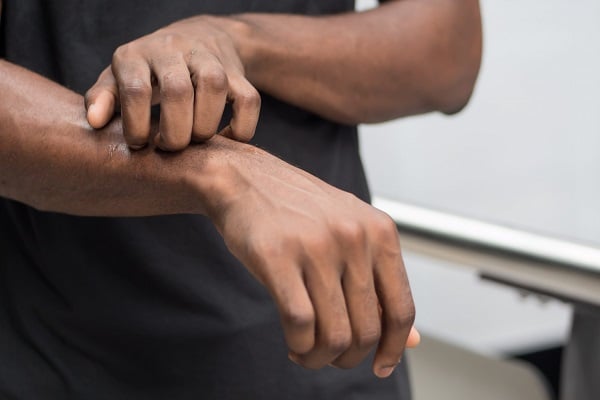Water has been hailed as life’s elixir, with the adage “water has no enemy” for ages. Yet, for some individuals, the touch of water on their skin brings discomfort and irritation.
You may have encountered someone who experiences intense itching or redness after bathing or coming into contact with water, making you wonder what is happening. This phenomenon is a skin condition, medically referred to as aquagenic pruritus.
This skin condition is quite prevalent but often goes undiscussed, leaving people affected by it with no clue of what exactly it is about.
According to a study, aquagenic pruritus affects as many as 23.8% of young Nigerian adults.
What is aquagenic pruritus?
Aquagenic pruritus is a rare skin condition characterised by the development of severe itching shortly after contact with water.
However, it does not cause visible symptoms such as hives or rashes. People with this condition experience symptoms within minutes of exposure to water.
The itching and burning sensations can last for an hour or longer, depending on the severity of the condition.
Any temperature and type of water can trigger this condition, including rainwater. According to a study, the most common type of water that triggers the condition is rainwater followed by cold water.
What causes aquagenic pruritus?
Aquagenic pruritus tends to be a complex condition, and its exact cause is unknown.
However, several factors may contribute to its development according to studies.
- Genetic Factor: A study suggests that there may be a genetic predisposition to aquagenic pruritus, as the condition can run in families. So it can be hereditary.
- Medications: Certain medications, such as bupropion, and medication for depression, have been found as potential triggers for aquagenic pruritus in some individuals.
- Underlying Medical Conditions: Aquagenic pruritus is often associated with certain underlying medical conditions, such as polycythemia vera (a type of blood cancer) or autoimmune diseases. A study also found that nearly two-thirds of people with polycythemia vera have aquagenic pruritus. These conditions may disrupt normal skin function and contribute to the development of aquagenic pruritus.
What are the symptoms of aquagenic pruritus?
The symptoms of aquagenic pruritus can vary in severity from person to person and may fluctuate over time. Some common symptoms include:
- Severe itching
- Stinging
- Tingling or burning sensation
- Redness
- Discomfort or irritation associated with water contact
How can aquagenic pruritus treated?
Unfortunately, aquagenic pruritus has no cure but there is a wide range of treatments, including medications, procedures, and natural remedies.
Some of these treatments include:
- Antihistamines: Oral antihistamine medications may be recommended to help alleviate itching and reduce allergic reactions associated with aquagenic pruritus.
- Medication adjustments: If aquagenic pruritus is associated with an underlying medical condition or medication, adjusting or discontinuing the use of certain medications may help alleviate symptoms. However, consulting medical professionals is crucial before making medication changes.
- Phototherapy: In severe cases, phototherapy may be considered as a treatment option. Phototherapy involves exposing the skin to ultraviolet (UV) light under controlled conditions, which can help reduce inflammation and itching associated with certain skin conditions.
Some other precautions that can be taken to control aquagenic pruritus include;
- Use tap water rather than rainwater for bathing where it is possible
- Apply emollients
- Always use warm water when bathing
- Stop using hard sponges on your skin
- You can also add baking soda to the water before bathing. A study has proven that baking soda, which is sodium bicarbonate can raise the pH of the water and may help lessen symptoms.
Copyright 2024 TheCable. All rights reserved. This material, and other digital content on this website, may not be reproduced, published, broadcast, rewritten or redistributed in whole or in part without prior express written permission from TheCable.
Follow us on twitter @Thecablestyle

